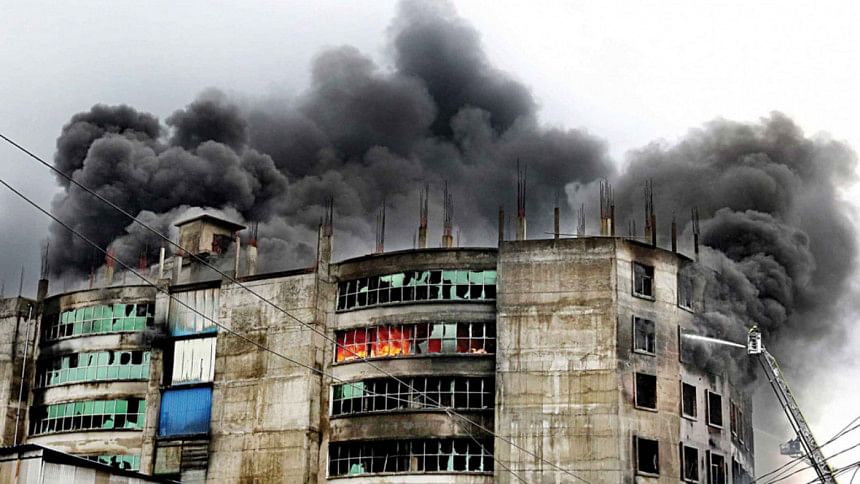How long will factory fires in Bangladesh continue unabated?

Between 8am on July 10 till 8am on July 11, a record 230 people had died of Covid-19, while 11,874 had been infected during the same time. In the midst of the unfolding Covid-19 crisis, we received the news of the devastating factory fire in Rupganj, Narayanganj. The blaze began on the evening of July 8 on the ground floor of the six-storey factory building of Hashem Foods Limited (which is a wing of Bangladeshi multinational Sajeeb Group).
The recovery efforts are still going on. Victims in white body bags were heaped in a fleet of ambulances first, and then in the morgue of Dhaka Medical College Hospital (DMCH), as relatives could only stand by and lament. Weeping family members waited outside the charred remains of the factory for any news of their loved ones. For those with family members still missing, the wait is now only for their remains, with no hope of finding their loved ones alive.
It is said that many workers jumped from the first two floors of the factory in a helpless bid to save their lives and at least 26 suffered injuries. The most devastating bit of information is that the only exit on the third floor of the factory was locked and many workers only died because they had been trapped inside.
Due to the frequency of such incidents involving fires, Bangladesh can now be named "a hub of firebombs". An old adage by Georg Hegel states "The only thing that we learn from history is that we learn nothing from history." If we look back over just the last three months, we will be able to recall another fire accident at a chemical storage facility on the ground floor of a six-storey building in Old Dhaka's Armanitola, which caused four deaths and injured 23 in April. From that, we can also remember the heart-rending chemical warehouse explosion that took place in February 2019 in Chawkbazar, Old Dhaka that killed nearly 70 people. At this incident's second anniversary this year, the relatives of the deceased lamented that they have not yet gotten the promised compensation from the government. What is most disquieting is that the government has failed to relocate chemical factories and warehouses from the over-populated, residential alleyways of Old Dhaka. This is despite the fact that Old Dhaka residents have been demanding the factories' relocation since the fire tragedy at a Nimtoli chemical warehouse on June 2, 2010, which claimed the lives of 123 people.
Disasters that occur due to fragile fire and building safety standards are obviously not a new phenomenon in Bangladesh and lead to accidents and hundreds of deaths every year. Though the millions of workers involved in the chemical and textile sector contributes largely to our economy, the factory owners' and government authorities' apparent disregard for their safety is cruel and criminal, to say the least.
Another recent fire incident is from March of this year, also in a chemical warehouse in Sreepur upazila, Gazipur. In this case, one factory worker died while 42 others became unwell after inhaling toxic gases from the burning chemicals. The workers alleged that the authorities had initially refused to open the main entrance so they could leave the factory during the fire—which is similar to how the gates of the Hashem Foods factory had been kept closed (allegedly by the owners' instructions), trapping the workers inside the burning building. There is undeniably a tendency among factory owners to not prioritise the safety of their workers (especially in garments and chemical factories), treating them like cogs in the wheels of the country's economy and not as human beings.
With the Covid-19 pandemic increasing our overall socio-economic vulnerability, people working for low wages are also becoming poorer. Such incidents at times like these, which display the neglect of authorities (both private and public) towards the lives of workers, only act as insult to injury.
Bangladesh has a saddening and long-standing history of industrial and chemical disasters wherein workers are locked inside and practically killed by the negligence of company owners. If we want to stop such incidents from occurring anymore, strict fire and building safety measures must be imposed, with the help and oversight of law enforcement agencies. Fire extinguishers need to be provided on each floor of an industrial establishment. Most importantly, workers need to be involved in regular fire drills in order to make them aware of what needs to be done in times of emergency, how fire extinguishers are operated and so on. Factories must also ensure proper emergency exits are in place so that workers can promptly and safely escape the premises if accidents occur.
Lax enforcement of regulations, and the corruption that leads to government officials and bodies looking the other way despite this lax enforcement, must be stopped. Though the authorities tend to introduce tougher safety rules after such disasters, they remain widely unimplemented and tragedies continue to take place. We should remember that the country's garment industry became largely compliant only after the horrific Rana Plaza tragedy, where 1,134 workers were killed, and that too under the watchful eyes of domestic and global watchdogs. However, it cannot just be the export-oriented indutries, our local industries need to be made to maintain safety compliance more strictly as well, especially by government bodies such as the Department of Inspection for Factories and Establishments (DIFE). A complete relocation of chemical warehouses is needed to ensure the safety of the people living in residential areas, as they are highly exposed to such disasters. The government must also compensate and rehabilitate the families of the victims and the injured, immediately and adequately. Such unimplemented initiatives of the government are what have turned our cities into firebombs and devalued the lives of our workers.
Monira Sharmin is a former student of the Institute of Disaster Management and Vulnerability Studies, University of Dhaka.

 For all latest news, follow The Daily Star's Google News channel.
For all latest news, follow The Daily Star's Google News channel. 



Comments